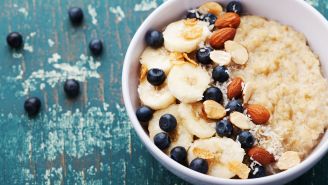Updated on April 1, 2024.
When you think of trying to lose weight, what comes to mind? Are you concerned about skipping foods you love? Do you worry about feeling hungry all the time or eating meals that aren’t tasty?
In fact, making drastic changes to your diet—especially ones that are difficult to maintain—could set you up for challenges. Instead, try these research-backed steps that can help you make wise food choices and cut calories.
Be smart about fruit
Many fruits are high in natural sugars and carbohydrates. That might sound like it could lead to weight gain. But, in fact, fruit is a vital part of a healthy diet.
A 2019 review of studies published in Frontiers in Nutrition found that regularly eating whole, fresh fruit was linked to either no weight change or offered protection against weight gain. (Whole fruit means fruit that isn’t processed or used as an ingredient in another dish.)
That’s likely because fruit is different from processed, artificially sweetened foods in a few important ways. Eating too much sugar is in general associated with health issues and weight gain. But whole fruit is filled with fiber, water, and a variety of vitamins and nutrients. These aspects of whole fruit can help you feel fuller for longer and boost your overall health.
Though eating any whole fruit offers health benefits, a 2020 review of studies published in Nutrients, put together a list of the most common fruits eaten in the United States that are linked to weight management. These healthy choices included apples, avocados, bananas, blueberries, grapes, lemons, oranges, peaches, strawberries, and watermelon.
Tip: For about 100 calories, have one medium-size apple, 1 cup of grapes, 16 medium strawberries, or 2 cups of watermelon.
Skip white bread and white rice
Refined grains like white bread and white rice lack the filling and healthful fiber, minerals, and other nutrients found in whole-grain breads, brown rice, and other whole-grain foods. But there are other reasons to say “no thanks” to refined grains.
For one thing, swapping out refined grains for whole grains has shown steady weight benefits. A 2019 meta-analysis of studies published in the journal Nutrients, for example, found that higher whole-grain intake is associated with a lower body mass index (BMI). It can also positively affect the way body weight changes over time.
Whole grains may also help protect you from diabetes. For a study published BMJ in 2020, researchers looked at data from about 200,000 people over several decades to discover who developed type 2 diabetes and how this related to whole grain intake. Those who ate more whole grains, including whole-grain bread and brown rice, had a significantly lower risk of the condition.
That’s not all. If you already have diabetes or difficulty managing your blood sugar, eating whole grains may have a positive effect. A 2022 meta-analysis of 32 studies published in the Journal of Diabetes Investigation, for example, found that it helped regulate fasting glucose levels (a measure of blood sugar).
Tip: Challenge yourself to ditch white bread for 10 days and see how much you really miss it. Try some whole-grain options instead. You could boost both your health and weight loss efforts.
Pump up the volume
Foods that are whipped or puffed with air may help you feel full without a lot of calories. The idea is that the food’s volume—the amount of space it takes up—can help with feeling satisfied.
Take popcorn. It’s light and airy and low in calories, so you end up eating about a third fewer calories than you would with an equivalent amount of more calorie-dense snacks, like potato chips.
If you use cream cheese or other spreads, try the whipped variety. They have fewer calories and fat per volume than regular varieties.
Tip: Try whipping air into eggs for fluffy omelets. To get maximum volume, mix them in a blender. When you’re ready to cook, don’t hold back on loading them up with nutrient-dense (but calorie-light) vegetables.







